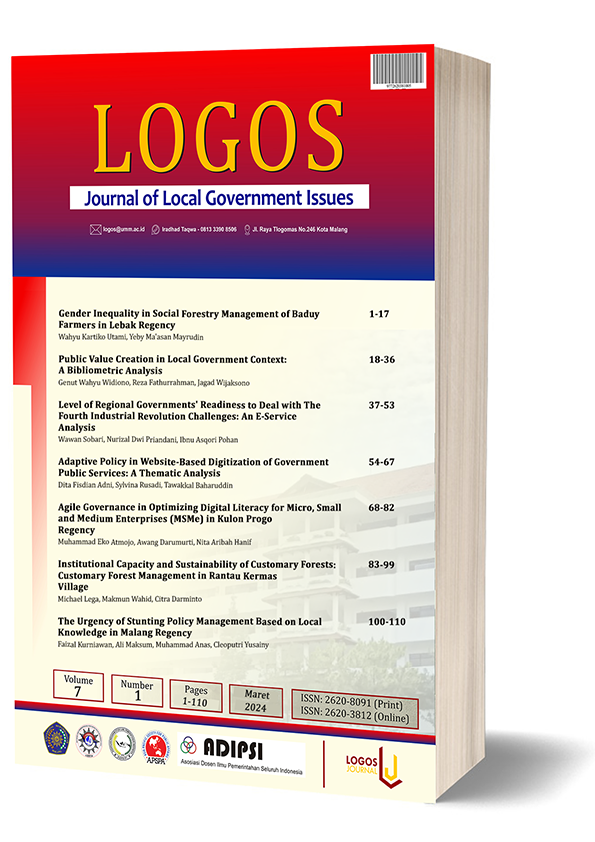Public Value Creation in Local Government Context: A Bibliometric Analysis
DOI:
https://doi.org/10.22219/logos.v7i1.27473Keywords:
Bibliometric analysis, Local Government, Public Administration, Public ValueAbstract
The purpose of this study is to identify the development of the public value creation’s concept in the context of local government in the last twenty years (2002 – 2022). The 177 scientific publications in the form of articles and conference papers that were selected from the Scopus Database were further analyzed using bibliometric analysis, which combined performance analysis and science mapping techniques. The analysis results show an increase in the number of publications dominated by western countries which can be categorized into five research clusters: e-government, smart city, public governance, co-creation, and public management. The researcher recommends fifteen research topics that can be explored further in future research.
Downloads
References
Alkaabi, S. K. A., & Sidek, S. (2022). Causative Factors for Continuous Usage of M-government Services Among Users of Smart City. International Journal of Sustainable Construction Engineering and Technology, 13(2 Special Issue), 213–219. https://doi.org/10.30880/ijscet.2022.13.02.019
Alkaabi, S. K. A., Sidek, S., & Mosali, N. A. (2022). Mediation Model of Factors Affecting Continuous Use of M-government Services of Abu Dhabi Smart City. International Journal of Sustainable Construction Engineering and Technology, 13(2 Special Issue), 141–152. https://doi.org/10.30880/ijscet.2022.13.02.013
Apriliyanti, I. D., & Alon, I. (2017). Bibliometric analysis of absorptive capacity. International Business Review, 26(5), 896–907. https://doi.org/10.1016/j.ibusrev.2017.02.007
Aswin, A., Ahad, M. P. Y., Silitonga, M. C. A., & Gusparirin, R. (2022). Bibliometric Analysis of Public Policy Research in Indonesia 2011-2021. Journal of Local Government Issues, 5(2), 80–96. https://doi.org/10.22219/logos.v5i2.21704
Baker, H. K., Kumar, S., & Pandey, N. (2021). Forty years of the Journal of Futures Markets: A Bibliometric Overview. Journal of Futures Markets, 41(7), 1027–1054. https://doi.org/10.1002/fut.22211
Bennington, J. (2011). From Private Choice to Public Value? In J. Bennington & M. . Moore (Eds.), Public Value: Theory and Practice (pp. 31–49). Palgrave Macmillan.
Bentzen, T. Ø., Sørensen, E., & Torfing, J. (2020). Strengthening public service production, administrative problem solving, and political leadership through co-creation of innovative public value outcomes? Innovation Journal, 25(1), 1–28.
Bryson, J. M., Crosby, B. C., & Bloomberg, L. (2014). Public Value Governance: Moving Beyond Traditional Public Administration and The New Public Management. Public Administration Review, 74(4), 445–456. https://doi.org/10.1111/puar.12238
Cobo, M. J., López-Herrera, A. G., Herrera-Viedma, E., & Herrera, F. (2011). An Approach for Detecting, Quantifying, and Visualizing the Evolution of a Research Field: A Practical Application to the Fuzzy Sets Theory Field. Journal of Informetrics, 5(1), 146–166. https://doi.org/10.1016/j.joi.2010.10.002
Costanza, F. (2022). Covid-related Educational Policies in Action: a System Dynamics View. International Journal of Public Sector Management, 35(4), 480–512. https://doi.org/10.1108/IJPSM-07-2021-0187
Da Silva Bastos Sales, L., Barbalho, S., & Augusto, R. (2021). A Bibliometric-Qualitative Study about the Use of System Dynamics in the Areas of Project and Program Management. Gestao e Producao, 28(4), 1–20. https://doi.org/10.1590/1806-9649-2021v28e5770
Donthu, N., Kumar, S., Mukherjee, D., Pandey, N., & Lim, W. M. (2021). How to conduct a bibliometric analysis: An overview and guidelines. Journal of Business Research, 133(April), 285–296. https://doi.org/10.1016/j.jbusres.2021.04.070
Faulkner, N., & Kaufman, S. (2018). Avoiding Theoretical Stagnation: A Systematic Review and Framework for Measuring Public Value. Australian Journal of Public Administration, 77(1), 69–86. https://doi.org/10.1111/1467-8500.12251
Forliano, C., De Bernardi, P., Bertello, A., & Temperini, V. (2020). Innovating Business Processes in Public Administrations: Towards a Systemic Approach. Business Process Management Journal, 26(5), 1203–1224. https://doi.org/10.1108/BPMJ-12-2019-0498
Fukumoto, E., & Bozeman, B. (2019). Public Values Theory: What Is Missing? American Review of Public Administration, 49(6), 635–648. https://doi.org/10.1177/0275074018814244
Grant, B. (2021). The Particular Applicability of Public Value Creation to Local Government. International Journal of Public Administration, 44(10), 835–844. https://doi.org/10.1080/01900692.2021.1903497
Hartley, J., Alford, J., Knies, E., & Douglas, S. (2017). Towards an empirical research agenda for public value theory. Public Management Review, 19(5), 670–685. https://doi.org/10.1080/14719037.2016.1192166
Huijbregts, R., George, B., & Bekkers, V. (2021). Public values assessment as a practice: integration of evidence and research agenda. Public Management Review, 24(6), 840–859. https://doi.org/10.1080/14719037.2020.1867227
Jørgensen, T. B., & Bozeman, B. (2007). Public Values: An Inventory. Administration & Society, 39(3), 354–381. https://doi.org/10.1177/0095399707300703
Logan, C. (2013). The Roots of Resilience: Exploring Popular Support for African Traditional Authorities. African Affairs, 112(448), 353–376. https://doi.org/10.1093/afraf/adt025
Lu, C. (2015). Urban Chinese Support for the Chinese Dream: Empirical Findings from Seventeen Cities. Journal of Chinese Political Science, 20(2), 143–161. https://doi.org/10.1007/s11366-015-9343-5
Marques, T. M. G. (2021). Research on Public Service Motivation and Leadership: A Bibliometric Study. International Journal of Public Administration, 44(7), 591–606. https://doi.org/10.1080/01900692.2020.1741615
Meijer, A., & Bolívar, M. P. R. (2016). Governing the smart city: a review of the literature on smart urban governance. International Review of Administrative Sciences, 82(2), 392–408. https://doi.org/10.1177/0020852314564308
Meijer, A., & Boon, W. (2021). Digital Platforms for the Co-creation of Public Value. Policy and Politics, 49(2), 231–248. https://doi.org/10.1332/030557321X16115951032181
Moore, M. . (1995). Creating Public Value: Strategic Management in Government. Harvard University Press.
Mossey, S., Bromberg, D., & Manoharan, A. P. (2019). Harnessing the Power of Mobile Technology to Bridge the Digital Divide: a Look at U.S. Cities' Mobile Government Capability. Journal of Information Technology and Politics, 16(1), 52–65. https://doi.org/10.1080/19331681.2018.1552224
Neumann, O., Matt, C., Hitz-Gamper, B. S., Schmidthuber, L., & Stürmer, M. (2019). Joining Forces for Public Value Creation? Exploring Collaborative Innovation in Smart City Initiatives. Government Information Quarterly, 36(4). https://doi.org/10.1016/j.giq.2019.101411
Nolan, C. T., & Garavan, T. N. (2016). Human Resource Development in SMEs: A Systematic Review of the Literature. International Journal of Management Reviews, 18(1), 85–107. https://doi.org/10.1111/ijmr.12062
O'Brien, E. A. (2005). Publics* and woodlands in England: Well-being, local identity, social learning, conflict and management. Forestry, 78(4), 321–336. https://doi.org/10.1093/forestry/cpi042
Pradana, I. P. Y. B., Susanto, E., & Kumorotomo, W. (2022). Bibliometric Analysis of Public Sector Innovation. Jurnal Ilmu Sosial Dan Ilmu Politik, 25(3), 297–315. https://doi.org/10.22146/jsp.69862
Ranchordás, S., & Goanta, C. (2020). The New City Regulators: Platform and Public Values in Smart and Sharing Cities. Computer Law and Security Review, 36. https://doi.org/10.1016/j.clsr.2019.105375
Rius-Ulldemolins, J., & Klein, R. (2021). From Artistic Direction to Cultural Management: Governance and Management of Barcelona's Artistic Institutions in the Twenty-first Century. International Journal of Public Sector Management, 34(1), 33–49. https://doi.org/10.1108/IJPSM-03-2020-0082
Roziqin, A., Kismartini, Fajrina, A. N., Salahudin, & Sulistyaningsih, T. (2022). The development of Indonesian e-Government: A bibliometric analysis. COLLNET Journal of Scientometrics and Information Management, 16(1), 49–74. https://doi.org/10.1080/09737766.2021.2007036
Salmoria, F. T., Félix Júnior, L. A., de Guimarães, J. C. F., Nodari, C. H., & Guimarães, L. G. de A. (2021). Public Value in the Perception of Citizens from the Perspective of Smart Cities. In BAR - Brazilian Administration Review (Vol. 18, Issue 4). https://doi.org/10.1590/1807-7692BAR2021200116
Sami, A., Jusoh, A., Nor, K. M., Irfan, A., & Qureshi, M. I. (2018). Systematic Review of Public Value. Journal of Public Value and Administration Insights (JPVAI), 1(1), 1–6. https://doi.org/10.31580/jpavi.v1i1.136
Soe, R. M., Sarv, L., & Gasco-Hernandez, M. (2022). Systematic Mapping of Long-Term Urban Challenges. Sustainability (Switzerland), 14(2), 1–12. https://doi.org/10.3390/su14020817
Sundberg, L., & Larsson, A. (2017). The Impact of Formal Decision Processes on e-government Projects. Administrative Sciences, 7(2), 1-12. https://doi.org/10.3390/admsci7020014
Tabi, M. T., & Verdon, D. (2014). New Public Service Performance Management Tools and Public Water Governance: The Main Lessons Drawn from Action Research Conducted in an Urban Environment. International Review of Administrative Sciences, 80(1), 213–235. https://doi.org/10.1177/0020852313511574
Torfing, J., & Sørensen, E. (2019). Interactive political leadership in theory and practice: how elected politicians may benefit from co-creating public value outcomes. Administrative Sciences, 9(3), 1-18. https://doi.org/10.3390/admsci9030051
Torfing, J., Torvatn, H., & Øyum, L. (2021). Constructing a Joint University‒Municipality Platform for Networked Co-creation of Innovative Urban Solutions: A Norwegian Experience. Innovation Journal, 26(3), 1-21.
Twizeyimana, J. D., & Andersson, A. (2019). The public value of E-Government – A literature review. Government Information Quarterly, 36(2), 167–178. https://doi.org/10.1016/j.giq.2019.01.001
Walravens, N. (2015). Qualitative Indicators for Smart City Business Models: The Case of Mobile Services and Applications. Telecommunications Policy, 39(3–4), 218–240. https://doi.org/10.1016/j.telpol.2014.12.011
Williams, I., & Shearer, H. (2011). Appraising Public Value: Past, Present and Futures. Public Administration, 89(4), 1367–1384. https://doi.org/10.1111/j.1467-9299.2011.01942.x
Downloads
Published
How to Cite
Issue
Section
License
Copyright (c) 2024 Genut Wahyu Widiono, Reza Fathurrahman, Jagad Wijaksono

This work is licensed under a Creative Commons Attribution-ShareAlike 4.0 International License.
Authors who publish with this journal agree to the following terms:
- Authors retain copyright and grant the journal right of first publication with the work simultaneously licensed under a Creative Commons Attribution-ShareAlike 4.0 International License. that allows others to share the work with an acknowledgment of the work's authorship and initial publication in this journal.
- Authors are able to enter into separate, additional contractual arrangements for the non-exclusive distribution of the journal's published version of the work (e.g., post it to an institutional repository or publish it in a book), with an acknowledgment of its initial publication in this journal.
- Authors are permitted and encouraged to post their work online (e.g., in institutional repositories or on their website) prior to and during the submission process, as it can lead to productive exchanges, as well as earlier and greater citation of published work (See The Effect of Open Access).

This work is licensed under a Creative Commons Attribution-ShareAlike 4.0 International License.













